Global Business Environment: Risks, Opportunities, and Policies
VerifiedAdded on 2020/12/30
|8
|2183
|138
Report
AI Summary
This report provides a detailed analysis of the global business environment, focusing on several key aspects. It begins by examining the rising risks faced by global social media firms, particularly Facebook and Twitter, due to government regulations concerning online safety and data privacy. The report then explores the opportunities for global expansion in emerging economies, highlighting the benefits and limitations of entering these markets. Finally, it discusses how governments utilize fiscal and monetary policies to stimulate economic activity and growth, using trickle-down economics as a central concept. The analysis covers various factors influencing business operations, including politics, culture, and technology, providing a comprehensive overview of the current global business landscape.
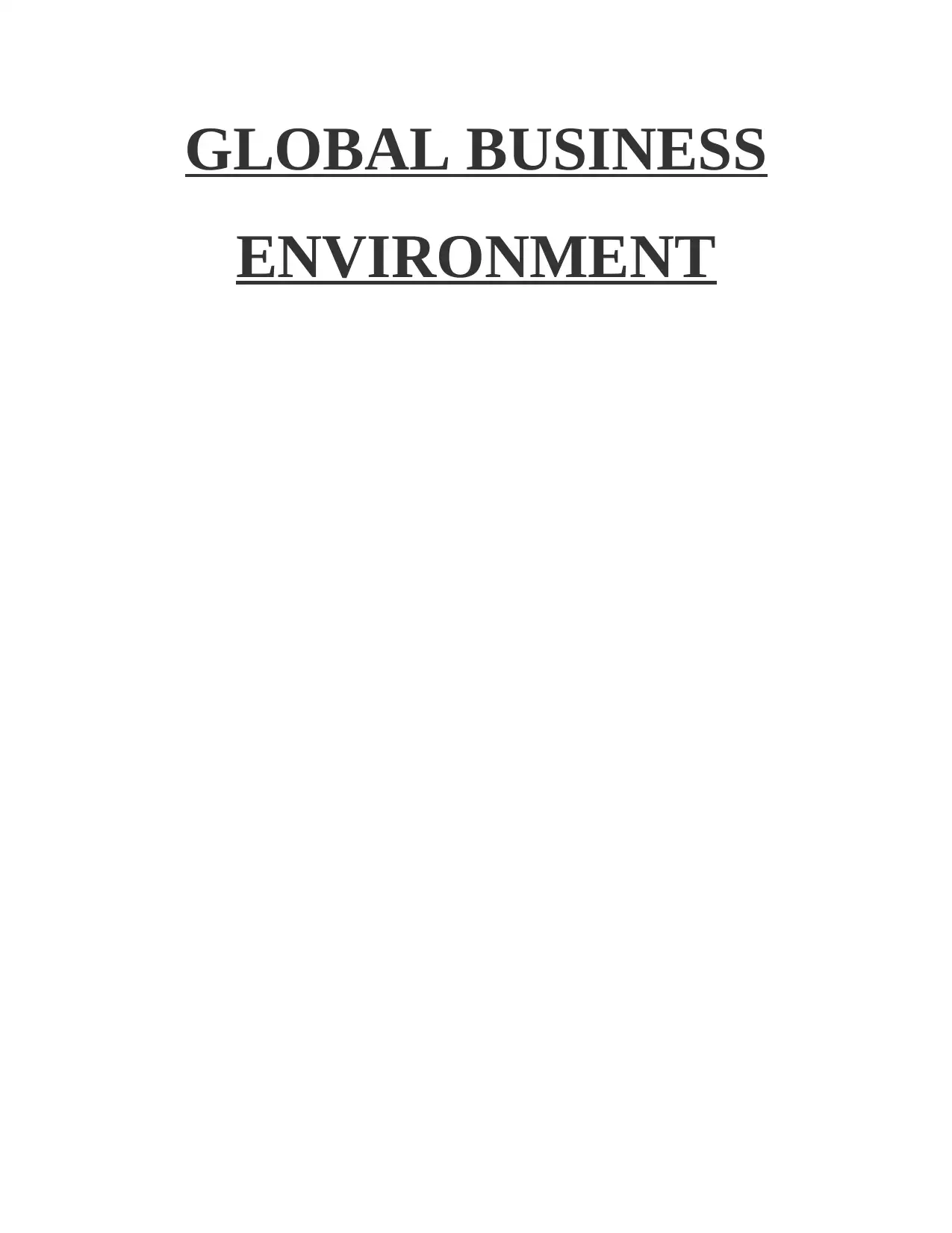
GLOBAL BUSINESS
ENVIRONMENT
ENVIRONMENT
Paraphrase This Document
Need a fresh take? Get an instant paraphrase of this document with our AI Paraphraser
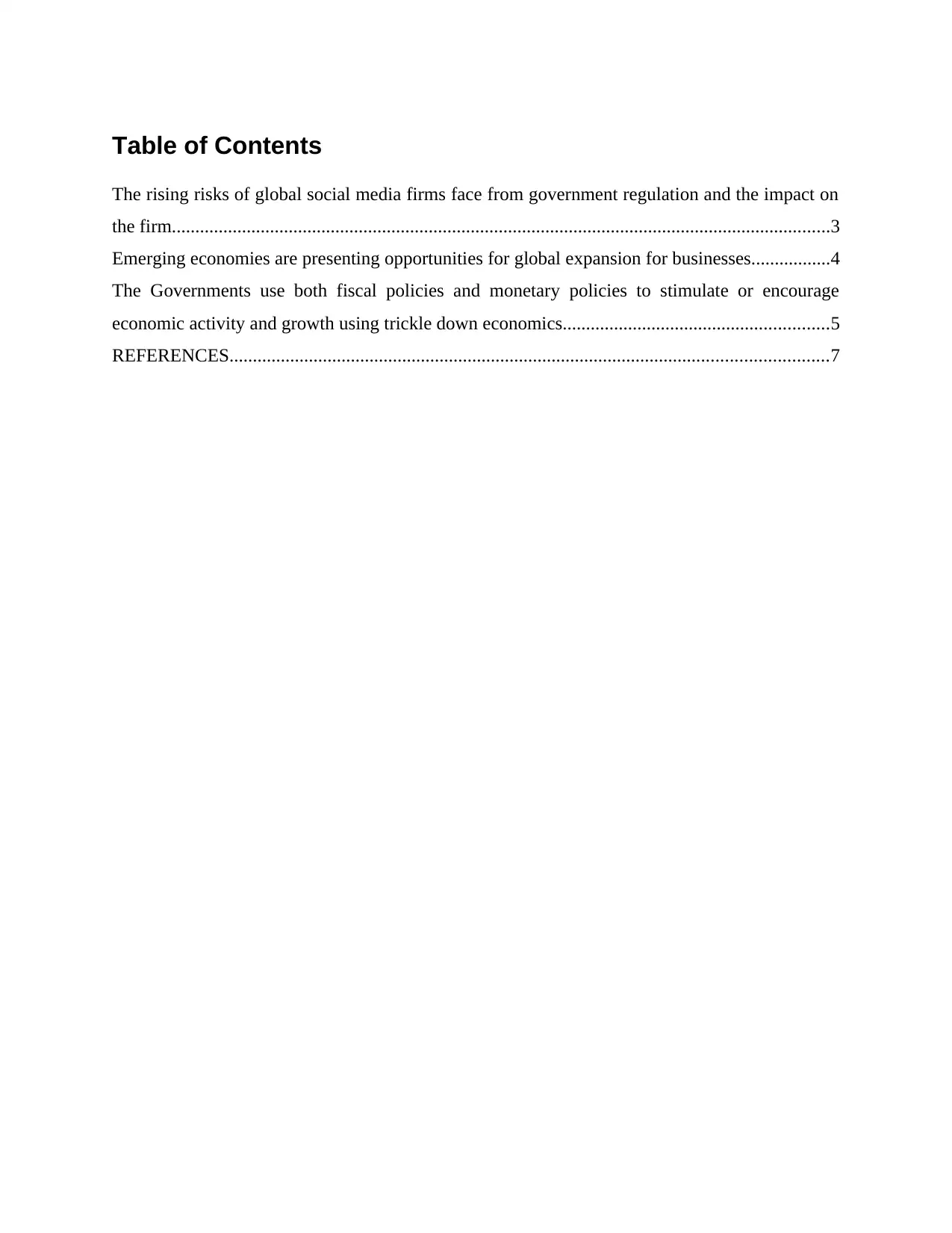
Table of Contents
The rising risks of global social media firms face from government regulation and the impact on
the firm.............................................................................................................................................3
Emerging economies are presenting opportunities for global expansion for businesses.................4
The Governments use both fiscal policies and monetary policies to stimulate or encourage
economic activity and growth using trickle down economics.........................................................5
REFERENCES................................................................................................................................7
The rising risks of global social media firms face from government regulation and the impact on
the firm.............................................................................................................................................3
Emerging economies are presenting opportunities for global expansion for businesses.................4
The Governments use both fiscal policies and monetary policies to stimulate or encourage
economic activity and growth using trickle down economics.........................................................5
REFERENCES................................................................................................................................7
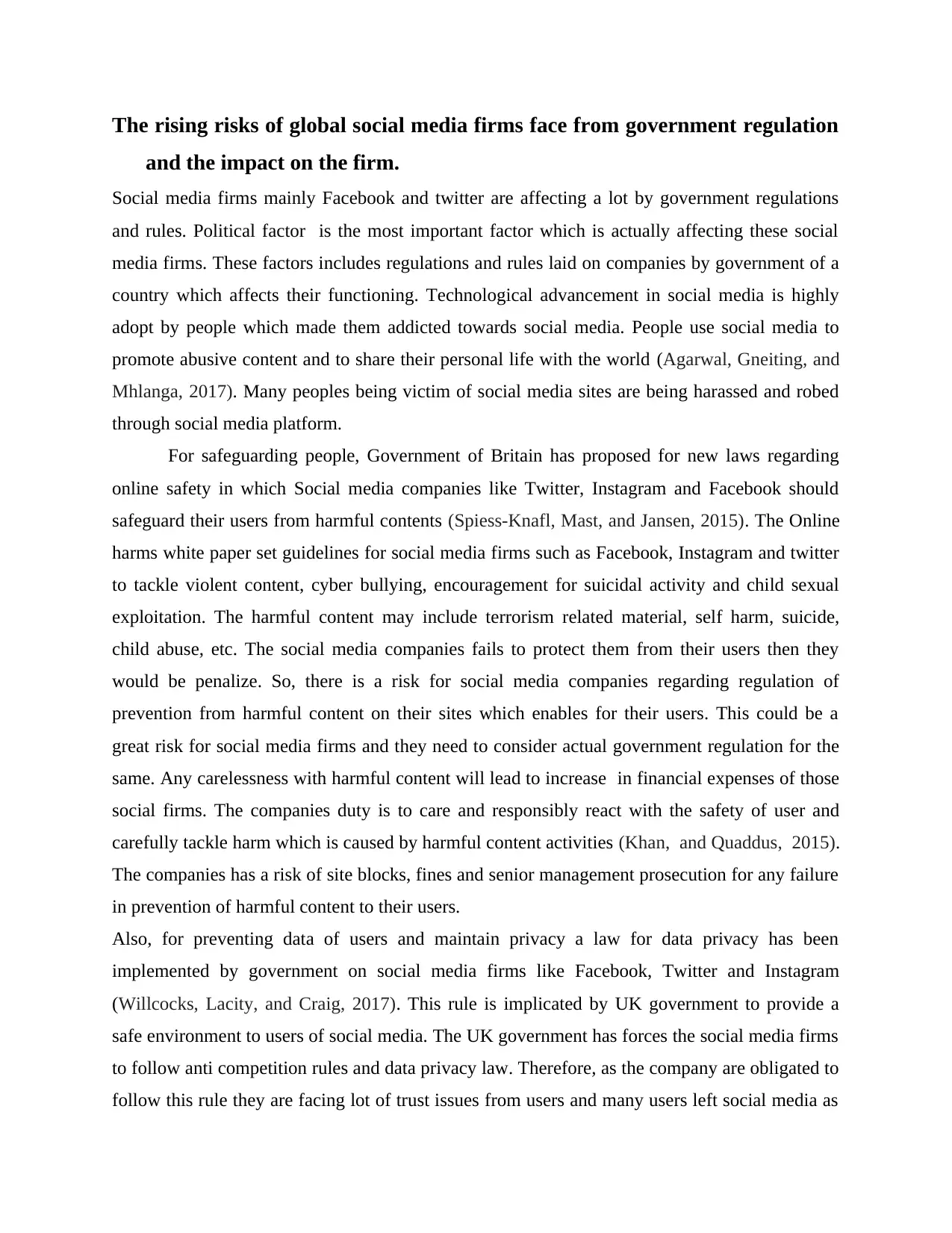
The rising risks of global social media firms face from government regulation
and the impact on the firm.
Social media firms mainly Facebook and twitter are affecting a lot by government regulations
and rules. Political factor is the most important factor which is actually affecting these social
media firms. These factors includes regulations and rules laid on companies by government of a
country which affects their functioning. Technological advancement in social media is highly
adopt by people which made them addicted towards social media. People use social media to
promote abusive content and to share their personal life with the world (Agarwal, Gneiting, and
Mhlanga, 2017). Many peoples being victim of social media sites are being harassed and robed
through social media platform.
For safeguarding people, Government of Britain has proposed for new laws regarding
online safety in which Social media companies like Twitter, Instagram and Facebook should
safeguard their users from harmful contents (Spiess-Knafl, Mast, and Jansen, 2015). The Online
harms white paper set guidelines for social media firms such as Facebook, Instagram and twitter
to tackle violent content, cyber bullying, encouragement for suicidal activity and child sexual
exploitation. The harmful content may include terrorism related material, self harm, suicide,
child abuse, etc. The social media companies fails to protect them from their users then they
would be penalize. So, there is a risk for social media companies regarding regulation of
prevention from harmful content on their sites which enables for their users. This could be a
great risk for social media firms and they need to consider actual government regulation for the
same. Any carelessness with harmful content will lead to increase in financial expenses of those
social firms. The companies duty is to care and responsibly react with the safety of user and
carefully tackle harm which is caused by harmful content activities (Khan, and Quaddus, 2015).
The companies has a risk of site blocks, fines and senior management prosecution for any failure
in prevention of harmful content to their users.
Also, for preventing data of users and maintain privacy a law for data privacy has been
implemented by government on social media firms like Facebook, Twitter and Instagram
(Willcocks, Lacity, and Craig, 2017). This rule is implicated by UK government to provide a
safe environment to users of social media. The UK government has forces the social media firms
to follow anti competition rules and data privacy law. Therefore, as the company are obligated to
follow this rule they are facing lot of trust issues from users and many users left social media as
and the impact on the firm.
Social media firms mainly Facebook and twitter are affecting a lot by government regulations
and rules. Political factor is the most important factor which is actually affecting these social
media firms. These factors includes regulations and rules laid on companies by government of a
country which affects their functioning. Technological advancement in social media is highly
adopt by people which made them addicted towards social media. People use social media to
promote abusive content and to share their personal life with the world (Agarwal, Gneiting, and
Mhlanga, 2017). Many peoples being victim of social media sites are being harassed and robed
through social media platform.
For safeguarding people, Government of Britain has proposed for new laws regarding
online safety in which Social media companies like Twitter, Instagram and Facebook should
safeguard their users from harmful contents (Spiess-Knafl, Mast, and Jansen, 2015). The Online
harms white paper set guidelines for social media firms such as Facebook, Instagram and twitter
to tackle violent content, cyber bullying, encouragement for suicidal activity and child sexual
exploitation. The harmful content may include terrorism related material, self harm, suicide,
child abuse, etc. The social media companies fails to protect them from their users then they
would be penalize. So, there is a risk for social media companies regarding regulation of
prevention from harmful content on their sites which enables for their users. This could be a
great risk for social media firms and they need to consider actual government regulation for the
same. Any carelessness with harmful content will lead to increase in financial expenses of those
social firms. The companies duty is to care and responsibly react with the safety of user and
carefully tackle harm which is caused by harmful content activities (Khan, and Quaddus, 2015).
The companies has a risk of site blocks, fines and senior management prosecution for any failure
in prevention of harmful content to their users.
Also, for preventing data of users and maintain privacy a law for data privacy has been
implemented by government on social media firms like Facebook, Twitter and Instagram
(Willcocks, Lacity, and Craig, 2017). This rule is implicated by UK government to provide a
safe environment to users of social media. The UK government has forces the social media firms
to follow anti competition rules and data privacy law. Therefore, as the company are obligated to
follow this rule they are facing lot of trust issues from users and many users left social media as
⊘ This is a preview!⊘
Do you want full access?
Subscribe today to unlock all pages.

Trusted by 1+ million students worldwide
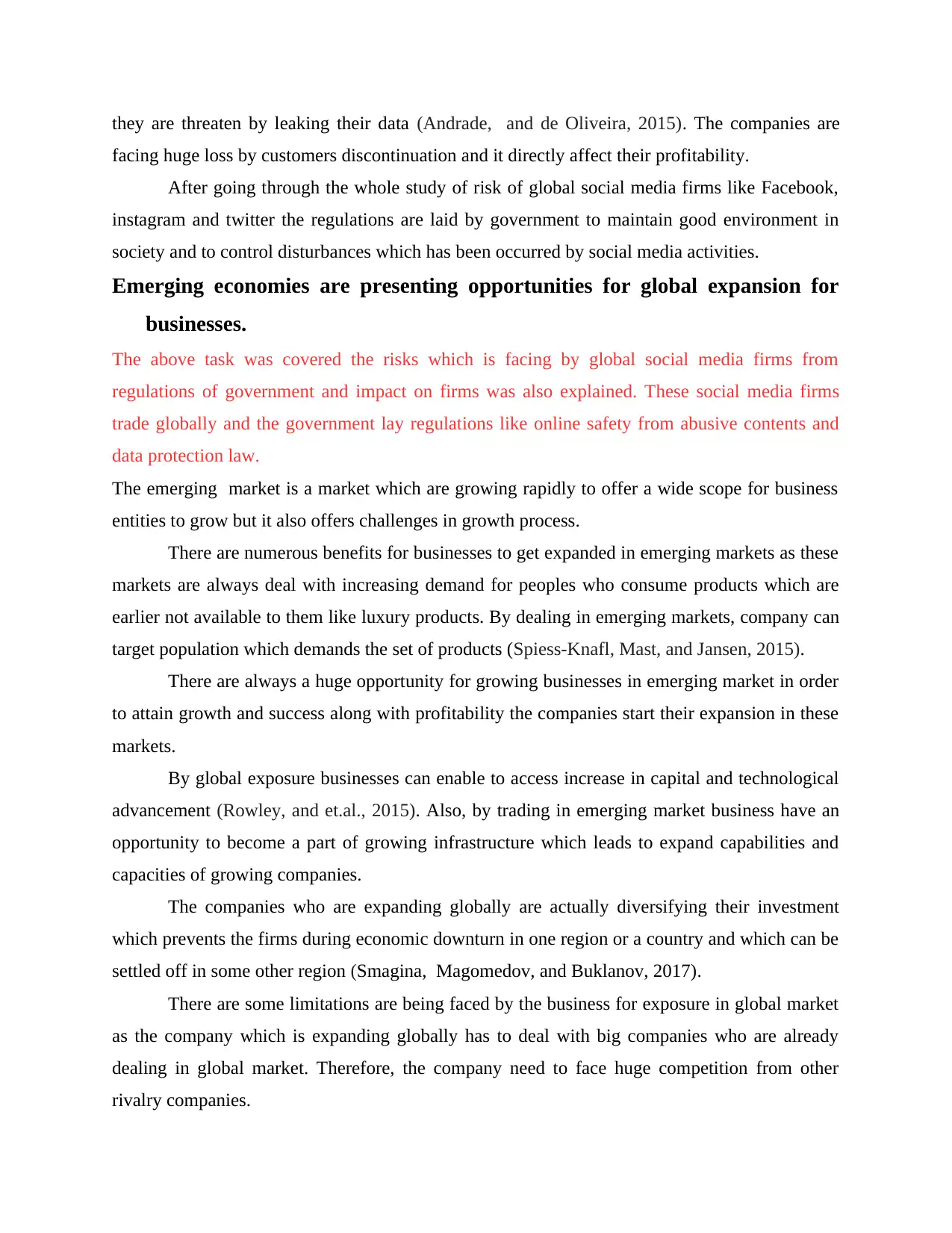
they are threaten by leaking their data (Andrade, and de Oliveira, 2015). The companies are
facing huge loss by customers discontinuation and it directly affect their profitability.
After going through the whole study of risk of global social media firms like Facebook,
instagram and twitter the regulations are laid by government to maintain good environment in
society and to control disturbances which has been occurred by social media activities.
Emerging economies are presenting opportunities for global expansion for
businesses.
The above task was covered the risks which is facing by global social media firms from
regulations of government and impact on firms was also explained. These social media firms
trade globally and the government lay regulations like online safety from abusive contents and
data protection law.
The emerging market is a market which are growing rapidly to offer a wide scope for business
entities to grow but it also offers challenges in growth process.
There are numerous benefits for businesses to get expanded in emerging markets as these
markets are always deal with increasing demand for peoples who consume products which are
earlier not available to them like luxury products. By dealing in emerging markets, company can
target population which demands the set of products (Spiess-Knafl, Mast, and Jansen, 2015).
There are always a huge opportunity for growing businesses in emerging market in order
to attain growth and success along with profitability the companies start their expansion in these
markets.
By global exposure businesses can enable to access increase in capital and technological
advancement (Rowley, and et.al., 2015). Also, by trading in emerging market business have an
opportunity to become a part of growing infrastructure which leads to expand capabilities and
capacities of growing companies.
The companies who are expanding globally are actually diversifying their investment
which prevents the firms during economic downturn in one region or a country and which can be
settled off in some other region (Smagina, Magomedov, and Buklanov, 2017).
There are some limitations are being faced by the business for exposure in global market
as the company which is expanding globally has to deal with big companies who are already
dealing in global market. Therefore, the company need to face huge competition from other
rivalry companies.
facing huge loss by customers discontinuation and it directly affect their profitability.
After going through the whole study of risk of global social media firms like Facebook,
instagram and twitter the regulations are laid by government to maintain good environment in
society and to control disturbances which has been occurred by social media activities.
Emerging economies are presenting opportunities for global expansion for
businesses.
The above task was covered the risks which is facing by global social media firms from
regulations of government and impact on firms was also explained. These social media firms
trade globally and the government lay regulations like online safety from abusive contents and
data protection law.
The emerging market is a market which are growing rapidly to offer a wide scope for business
entities to grow but it also offers challenges in growth process.
There are numerous benefits for businesses to get expanded in emerging markets as these
markets are always deal with increasing demand for peoples who consume products which are
earlier not available to them like luxury products. By dealing in emerging markets, company can
target population which demands the set of products (Spiess-Knafl, Mast, and Jansen, 2015).
There are always a huge opportunity for growing businesses in emerging market in order
to attain growth and success along with profitability the companies start their expansion in these
markets.
By global exposure businesses can enable to access increase in capital and technological
advancement (Rowley, and et.al., 2015). Also, by trading in emerging market business have an
opportunity to become a part of growing infrastructure which leads to expand capabilities and
capacities of growing companies.
The companies who are expanding globally are actually diversifying their investment
which prevents the firms during economic downturn in one region or a country and which can be
settled off in some other region (Smagina, Magomedov, and Buklanov, 2017).
There are some limitations are being faced by the business for exposure in global market
as the company which is expanding globally has to deal with big companies who are already
dealing in global market. Therefore, the company need to face huge competition from other
rivalry companies.
Paraphrase This Document
Need a fresh take? Get an instant paraphrase of this document with our AI Paraphraser
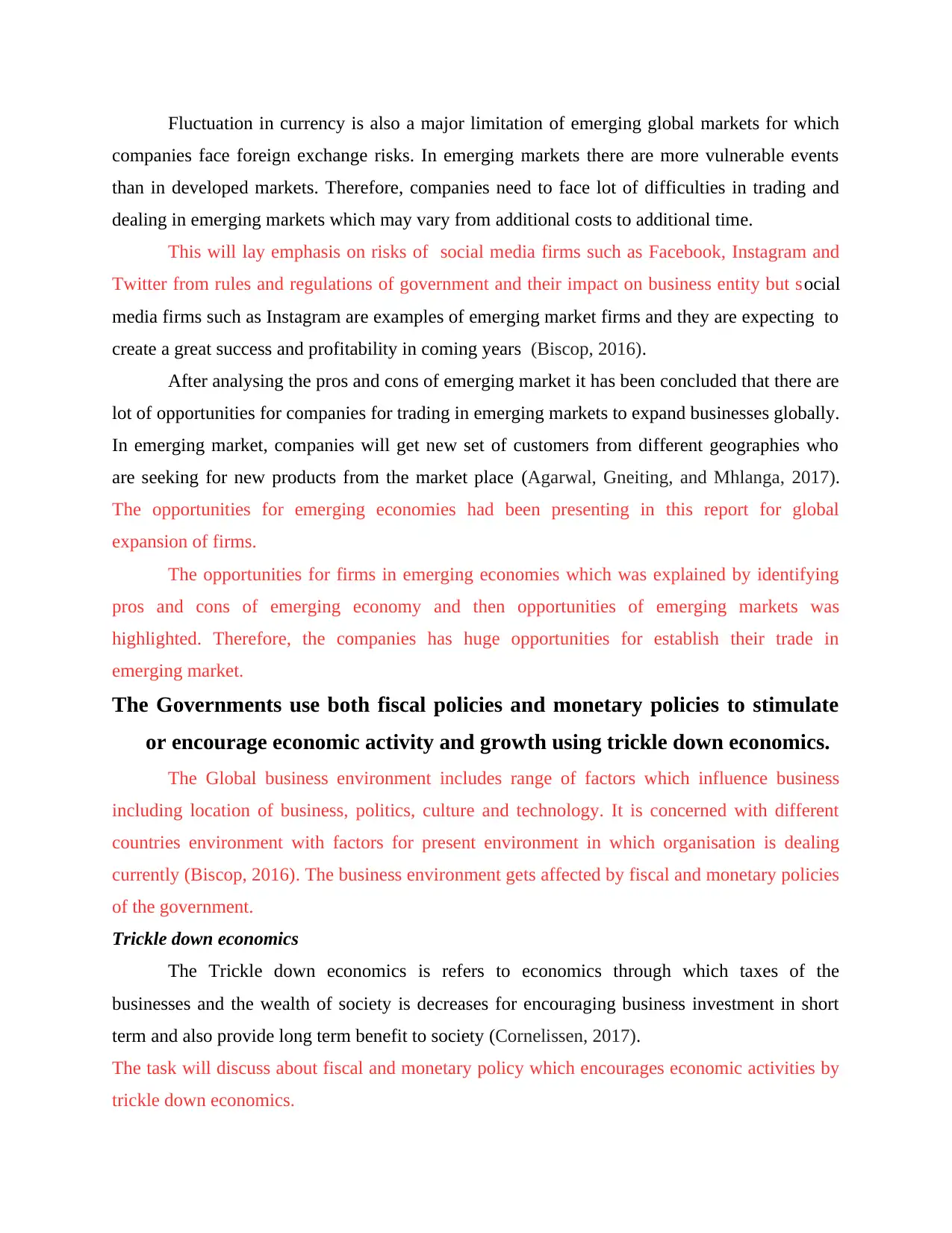
Fluctuation in currency is also a major limitation of emerging global markets for which
companies face foreign exchange risks. In emerging markets there are more vulnerable events
than in developed markets. Therefore, companies need to face lot of difficulties in trading and
dealing in emerging markets which may vary from additional costs to additional time.
This will lay emphasis on risks of social media firms such as Facebook, Instagram and
Twitter from rules and regulations of government and their impact on business entity but social
media firms such as Instagram are examples of emerging market firms and they are expecting to
create a great success and profitability in coming years (Biscop, 2016).
After analysing the pros and cons of emerging market it has been concluded that there are
lot of opportunities for companies for trading in emerging markets to expand businesses globally.
In emerging market, companies will get new set of customers from different geographies who
are seeking for new products from the market place (Agarwal, Gneiting, and Mhlanga, 2017).
The opportunities for emerging economies had been presenting in this report for global
expansion of firms.
The opportunities for firms in emerging economies which was explained by identifying
pros and cons of emerging economy and then opportunities of emerging markets was
highlighted. Therefore, the companies has huge opportunities for establish their trade in
emerging market.
The Governments use both fiscal policies and monetary policies to stimulate
or encourage economic activity and growth using trickle down economics.
The Global business environment includes range of factors which influence business
including location of business, politics, culture and technology. It is concerned with different
countries environment with factors for present environment in which organisation is dealing
currently (Biscop, 2016). The business environment gets affected by fiscal and monetary policies
of the government.
Trickle down economics
The Trickle down economics is refers to economics through which taxes of the
businesses and the wealth of society is decreases for encouraging business investment in short
term and also provide long term benefit to society (Cornelissen, 2017).
The task will discuss about fiscal and monetary policy which encourages economic activities by
trickle down economics.
companies face foreign exchange risks. In emerging markets there are more vulnerable events
than in developed markets. Therefore, companies need to face lot of difficulties in trading and
dealing in emerging markets which may vary from additional costs to additional time.
This will lay emphasis on risks of social media firms such as Facebook, Instagram and
Twitter from rules and regulations of government and their impact on business entity but social
media firms such as Instagram are examples of emerging market firms and they are expecting to
create a great success and profitability in coming years (Biscop, 2016).
After analysing the pros and cons of emerging market it has been concluded that there are
lot of opportunities for companies for trading in emerging markets to expand businesses globally.
In emerging market, companies will get new set of customers from different geographies who
are seeking for new products from the market place (Agarwal, Gneiting, and Mhlanga, 2017).
The opportunities for emerging economies had been presenting in this report for global
expansion of firms.
The opportunities for firms in emerging economies which was explained by identifying
pros and cons of emerging economy and then opportunities of emerging markets was
highlighted. Therefore, the companies has huge opportunities for establish their trade in
emerging market.
The Governments use both fiscal policies and monetary policies to stimulate
or encourage economic activity and growth using trickle down economics.
The Global business environment includes range of factors which influence business
including location of business, politics, culture and technology. It is concerned with different
countries environment with factors for present environment in which organisation is dealing
currently (Biscop, 2016). The business environment gets affected by fiscal and monetary policies
of the government.
Trickle down economics
The Trickle down economics is refers to economics through which taxes of the
businesses and the wealth of society is decreases for encouraging business investment in short
term and also provide long term benefit to society (Cornelissen, 2017).
The task will discuss about fiscal and monetary policy which encourages economic activities by
trickle down economics.
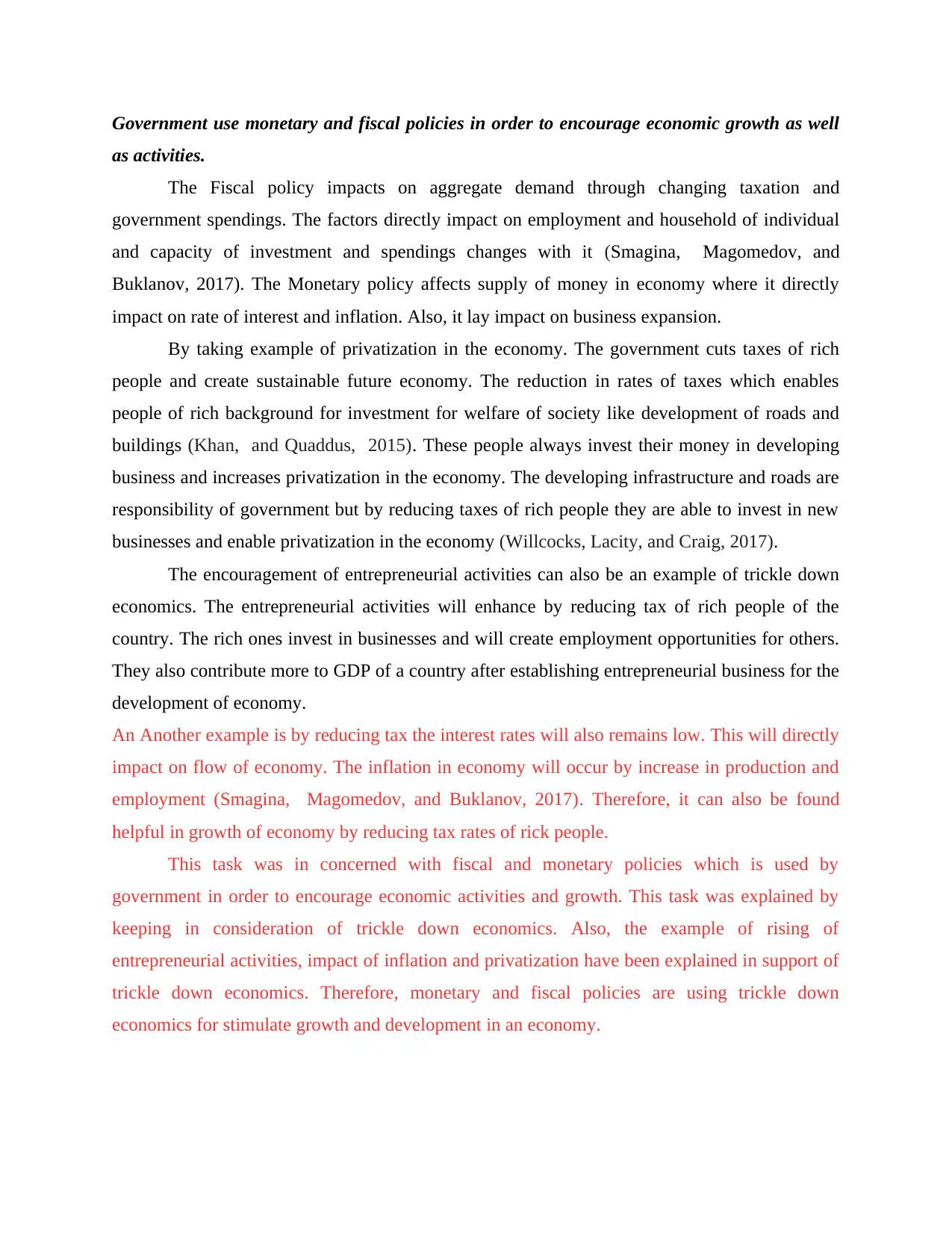
Government use monetary and fiscal policies in order to encourage economic growth as well
as activities.
The Fiscal policy impacts on aggregate demand through changing taxation and
government spendings. The factors directly impact on employment and household of individual
and capacity of investment and spendings changes with it (Smagina, Magomedov, and
Buklanov, 2017). The Monetary policy affects supply of money in economy where it directly
impact on rate of interest and inflation. Also, it lay impact on business expansion.
By taking example of privatization in the economy. The government cuts taxes of rich
people and create sustainable future economy. The reduction in rates of taxes which enables
people of rich background for investment for welfare of society like development of roads and
buildings (Khan, and Quaddus, 2015). These people always invest their money in developing
business and increases privatization in the economy. The developing infrastructure and roads are
responsibility of government but by reducing taxes of rich people they are able to invest in new
businesses and enable privatization in the economy (Willcocks, Lacity, and Craig, 2017).
The encouragement of entrepreneurial activities can also be an example of trickle down
economics. The entrepreneurial activities will enhance by reducing tax of rich people of the
country. The rich ones invest in businesses and will create employment opportunities for others.
They also contribute more to GDP of a country after establishing entrepreneurial business for the
development of economy.
An Another example is by reducing tax the interest rates will also remains low. This will directly
impact on flow of economy. The inflation in economy will occur by increase in production and
employment (Smagina, Magomedov, and Buklanov, 2017). Therefore, it can also be found
helpful in growth of economy by reducing tax rates of rick people.
This task was in concerned with fiscal and monetary policies which is used by
government in order to encourage economic activities and growth. This task was explained by
keeping in consideration of trickle down economics. Also, the example of rising of
entrepreneurial activities, impact of inflation and privatization have been explained in support of
trickle down economics. Therefore, monetary and fiscal policies are using trickle down
economics for stimulate growth and development in an economy.
as activities.
The Fiscal policy impacts on aggregate demand through changing taxation and
government spendings. The factors directly impact on employment and household of individual
and capacity of investment and spendings changes with it (Smagina, Magomedov, and
Buklanov, 2017). The Monetary policy affects supply of money in economy where it directly
impact on rate of interest and inflation. Also, it lay impact on business expansion.
By taking example of privatization in the economy. The government cuts taxes of rich
people and create sustainable future economy. The reduction in rates of taxes which enables
people of rich background for investment for welfare of society like development of roads and
buildings (Khan, and Quaddus, 2015). These people always invest their money in developing
business and increases privatization in the economy. The developing infrastructure and roads are
responsibility of government but by reducing taxes of rich people they are able to invest in new
businesses and enable privatization in the economy (Willcocks, Lacity, and Craig, 2017).
The encouragement of entrepreneurial activities can also be an example of trickle down
economics. The entrepreneurial activities will enhance by reducing tax of rich people of the
country. The rich ones invest in businesses and will create employment opportunities for others.
They also contribute more to GDP of a country after establishing entrepreneurial business for the
development of economy.
An Another example is by reducing tax the interest rates will also remains low. This will directly
impact on flow of economy. The inflation in economy will occur by increase in production and
employment (Smagina, Magomedov, and Buklanov, 2017). Therefore, it can also be found
helpful in growth of economy by reducing tax rates of rick people.
This task was in concerned with fiscal and monetary policies which is used by
government in order to encourage economic activities and growth. This task was explained by
keeping in consideration of trickle down economics. Also, the example of rising of
entrepreneurial activities, impact of inflation and privatization have been explained in support of
trickle down economics. Therefore, monetary and fiscal policies are using trickle down
economics for stimulate growth and development in an economy.
⊘ This is a preview!⊘
Do you want full access?
Subscribe today to unlock all pages.

Trusted by 1+ million students worldwide
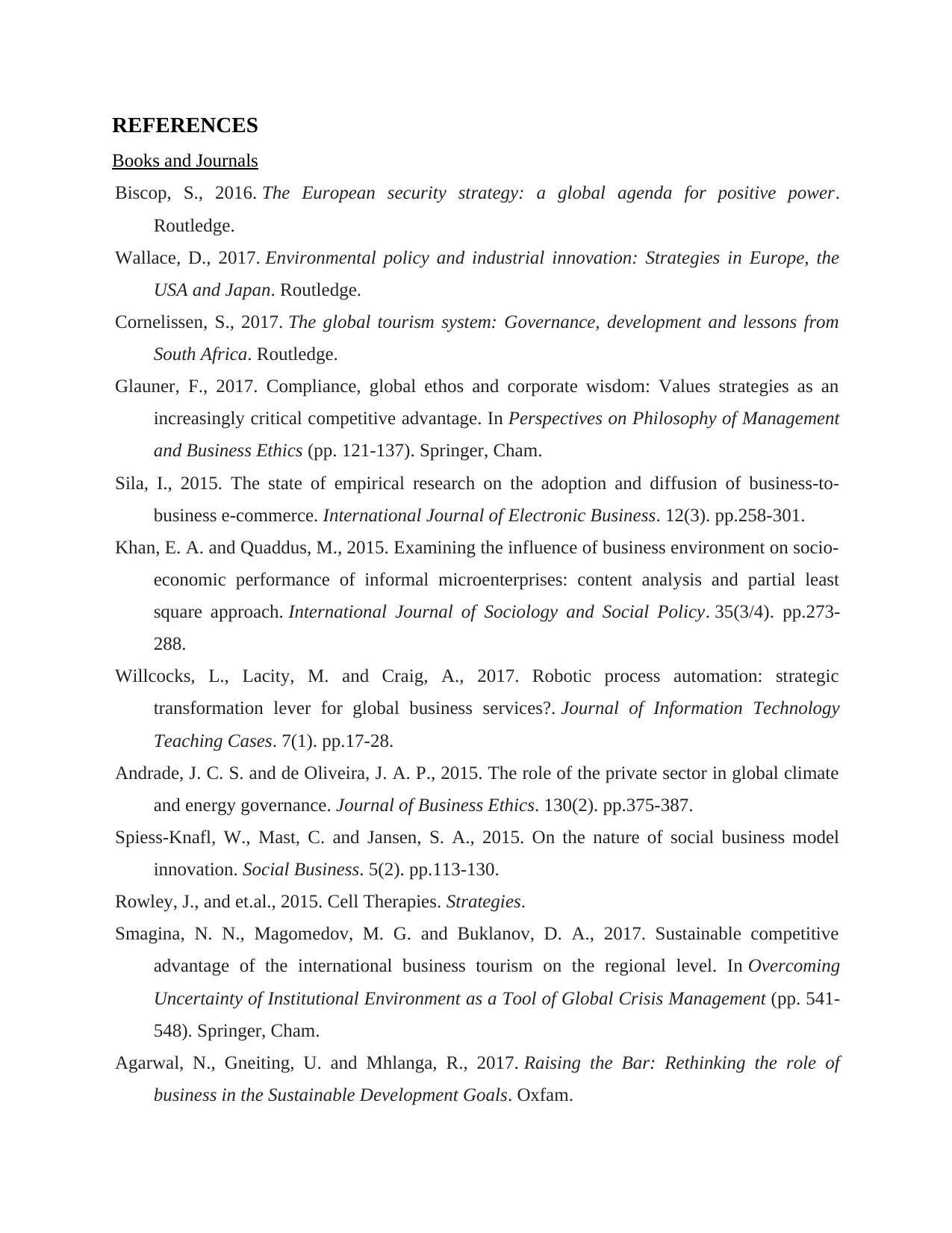
REFERENCES
Books and Journals
Biscop, S., 2016. The European security strategy: a global agenda for positive power.
Routledge.
Wallace, D., 2017. Environmental policy and industrial innovation: Strategies in Europe, the
USA and Japan. Routledge.
Cornelissen, S., 2017. The global tourism system: Governance, development and lessons from
South Africa. Routledge.
Glauner, F., 2017. Compliance, global ethos and corporate wisdom: Values strategies as an
increasingly critical competitive advantage. In Perspectives on Philosophy of Management
and Business Ethics (pp. 121-137). Springer, Cham.
Sila, I., 2015. The state of empirical research on the adoption and diffusion of business-to-
business e-commerce. International Journal of Electronic Business. 12(3). pp.258-301.
Khan, E. A. and Quaddus, M., 2015. Examining the influence of business environment on socio-
economic performance of informal microenterprises: content analysis and partial least
square approach. International Journal of Sociology and Social Policy. 35(3/4). pp.273-
288.
Willcocks, L., Lacity, M. and Craig, A., 2017. Robotic process automation: strategic
transformation lever for global business services?. Journal of Information Technology
Teaching Cases. 7(1). pp.17-28.
Andrade, J. C. S. and de Oliveira, J. A. P., 2015. The role of the private sector in global climate
and energy governance. Journal of Business Ethics. 130(2). pp.375-387.
Spiess-Knafl, W., Mast, C. and Jansen, S. A., 2015. On the nature of social business model
innovation. Social Business. 5(2). pp.113-130.
Rowley, J., and et.al., 2015. Cell Therapies. Strategies.
Smagina, N. N., Magomedov, M. G. and Buklanov, D. A., 2017. Sustainable competitive
advantage of the international business tourism on the regional level. In Overcoming
Uncertainty of Institutional Environment as a Tool of Global Crisis Management (pp. 541-
548). Springer, Cham.
Agarwal, N., Gneiting, U. and Mhlanga, R., 2017. Raising the Bar: Rethinking the role of
business in the Sustainable Development Goals. Oxfam.
Books and Journals
Biscop, S., 2016. The European security strategy: a global agenda for positive power.
Routledge.
Wallace, D., 2017. Environmental policy and industrial innovation: Strategies in Europe, the
USA and Japan. Routledge.
Cornelissen, S., 2017. The global tourism system: Governance, development and lessons from
South Africa. Routledge.
Glauner, F., 2017. Compliance, global ethos and corporate wisdom: Values strategies as an
increasingly critical competitive advantage. In Perspectives on Philosophy of Management
and Business Ethics (pp. 121-137). Springer, Cham.
Sila, I., 2015. The state of empirical research on the adoption and diffusion of business-to-
business e-commerce. International Journal of Electronic Business. 12(3). pp.258-301.
Khan, E. A. and Quaddus, M., 2015. Examining the influence of business environment on socio-
economic performance of informal microenterprises: content analysis and partial least
square approach. International Journal of Sociology and Social Policy. 35(3/4). pp.273-
288.
Willcocks, L., Lacity, M. and Craig, A., 2017. Robotic process automation: strategic
transformation lever for global business services?. Journal of Information Technology
Teaching Cases. 7(1). pp.17-28.
Andrade, J. C. S. and de Oliveira, J. A. P., 2015. The role of the private sector in global climate
and energy governance. Journal of Business Ethics. 130(2). pp.375-387.
Spiess-Knafl, W., Mast, C. and Jansen, S. A., 2015. On the nature of social business model
innovation. Social Business. 5(2). pp.113-130.
Rowley, J., and et.al., 2015. Cell Therapies. Strategies.
Smagina, N. N., Magomedov, M. G. and Buklanov, D. A., 2017. Sustainable competitive
advantage of the international business tourism on the regional level. In Overcoming
Uncertainty of Institutional Environment as a Tool of Global Crisis Management (pp. 541-
548). Springer, Cham.
Agarwal, N., Gneiting, U. and Mhlanga, R., 2017. Raising the Bar: Rethinking the role of
business in the Sustainable Development Goals. Oxfam.
Paraphrase This Document
Need a fresh take? Get an instant paraphrase of this document with our AI Paraphraser
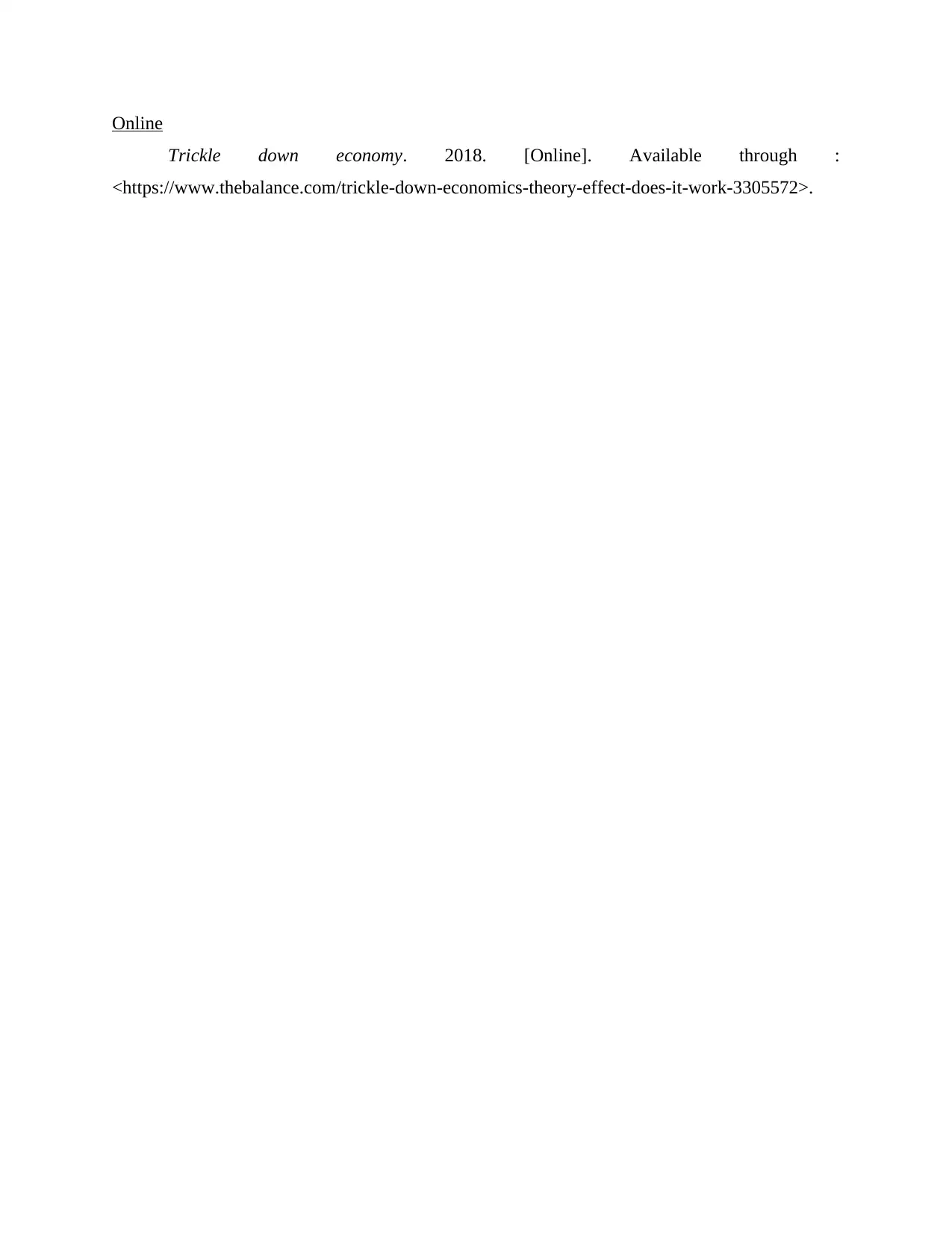
Online
Trickle down economy. 2018. [Online]. Available through :
<https://www.thebalance.com/trickle-down-economics-theory-effect-does-it-work-3305572>.
Trickle down economy. 2018. [Online]. Available through :
<https://www.thebalance.com/trickle-down-economics-theory-effect-does-it-work-3305572>.
1 out of 8
Related Documents
Your All-in-One AI-Powered Toolkit for Academic Success.
+13062052269
info@desklib.com
Available 24*7 on WhatsApp / Email
![[object Object]](/_next/static/media/star-bottom.7253800d.svg)
Unlock your academic potential
Copyright © 2020–2026 A2Z Services. All Rights Reserved. Developed and managed by ZUCOL.





